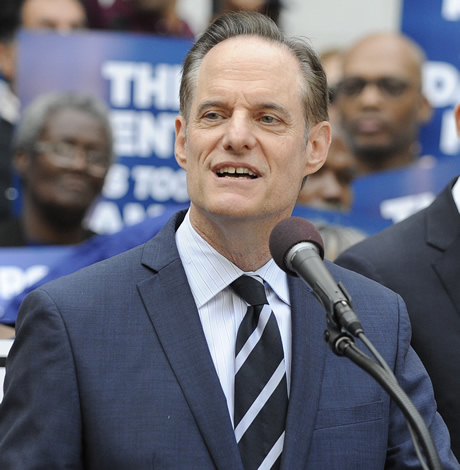National
Another Black man found dead in Ed Buck’s WeHo apartment
Raises questions and begs for clarity
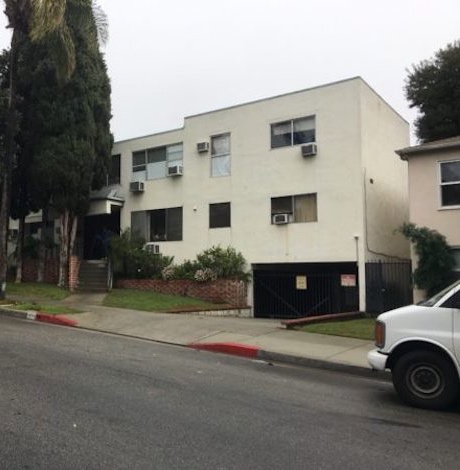
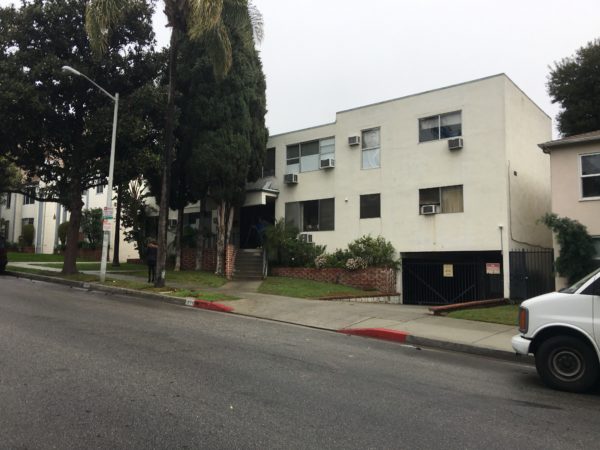
When the news first hit early Monday morning, it sounded tragically familiar and frightening: a source alerted a Los Angeles Blade freelancer that Los Angeles County Sheriff’s Homicide investigators, along with Medical Examiner personnel from the County Coroner’s office, were on the scene at 1234 N. Laurel Ave. in West Hollywood investigating the death of a young black male.
That was Ed Buck’s apartment, site of the apparent overdose death on July 27, 2017 of Gemmel Moore, a 26-year old Black male escort who had been a frequent visitor to Buck’s apartment and, through his discovered journal, posthumously claimed Buck hooked him on crystal meth as part of a sexual predilection.
“It is suspicious that this has happened twice now,” L.A. County Sheriff’s Lt. Derrick Alfred told KTLA Monday afternoon, Jan. 7. But, KTLA added, “Buck is currently not considered a suspect and not in custody, officials said.”
“Currently” perhaps being the word that might catch the eye of those who still angrily believe that Moore’s case was treated differently than if the dead person in Buck’s apartment had been white and Buck had been African American.
Moore’s mother and community activists believed Buck had injected Gemmel with the drugs that killed him, making his death a homicide. But the gruesome Coroner’s report ruled the death an accidental overdose and the case was eventually dismissed by the LA County District Attorney for lack of evidence “beyond a reasonable doubt.”
Though the initial investigators questioned Buck’s neighbors and confirmed his penchant for young Black men, the Coroner ruled Moore’s death accidental and there was nothing to directly tie Buck to Moore’s overdose. That prompted calls of racism.
“If that incident had occurred in my home, the police would have kicked down my door, guns drawn and had me in handcuffs. There’s no doubt about it. That’s how it goes,” Jeffrey King, executive director of In The Meantime Men told the Los Angeles Blade after Moore’s death.

“That’s part of the bigger issue here. That guy [Buck] was treated like a respectable citizen. But a drug-related accident occurred in a man’s house. He should have been taken down to the station and questioned, at minimum. This is a matter of race on a minimum level. The value of this kid’s life is not the same as a prominent person’s child—he would have been handled different. The police would have been relentless; the DA would have been relentless; the whole system would have been relentless,” King said.
That’s why the chaos that resulted from the second death in Ed Buck’s apartment is so shocking: from very early Monday morning to very late Monday night, despite urgent calls and pleas for accurate information, several levels of the LA Sheriff’s Department stonewalled and stymied press inquiries as well as community members—thus allowing misinformation to dominate the fevered discussions. Surely someone in the Sheriff’s Department remembered the outcry over Moore’s death. Surely someone realized the indignity silence conferred on the second Black man to die in Ed Buck’s apartment in 18 months. Surely someone would react publicly as if this was a hate crime in West Hollywood. But, no.
One easy to convey piece of information that was withheld from the public: the victim was a black man in his mid-50s. In the information vacuum, the community passed along the inaccurate news provided by that first tipster and some of Buck’s neighbors that this death was essentially another Gemmel Moore.
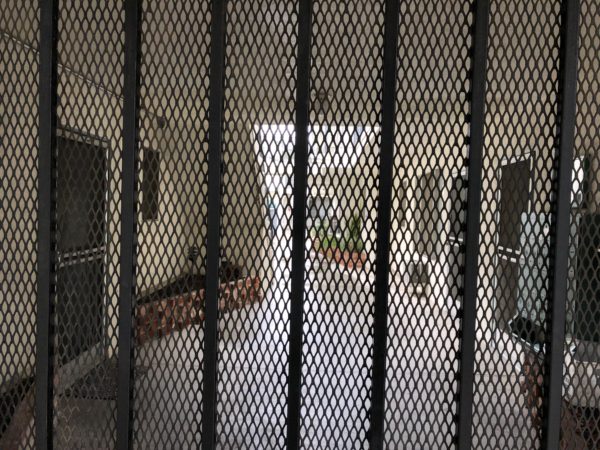
One unidentified neighbor interviewed by KTLA said she was out walking her dog around 12:15am when she saw a young black man go into Buck’s apartment. She then saw an older Black man, a “huge gentleman,” go into Buck’s apartment but she didn’t see either of them come out. She called the man’s death a “tragedy.”
Most reports from neighbors indicated that Sheriff’s deputies were on the scene around 3:15am. But Alfred told the Los Angeles Blade that a sheriff’s deputy and paramedics arrived at Buck’s apartment shortly before 1:00am after a 911 call of a person not breathing. The caller was the other person in the apartment—Ed Buck—who performed CPR on the man and called 911 when he was unsuccessful. The Fire Department pronounced the man dead at the scene.
Alfred said they do not yet have a positive identification from the Coroner’s office. However, the man is believed to be “a male Black adult, who is approximately 55 years old, if it’s the person we think it is, the person is definitely in his mid-50s.”

Was there any evidence to indicate this death was in any way drug-related? In the Gemmel Moore case the coroner’s report noted “24 syringes with brown residue, five glass pipes with white residue and burn marks, a plastic straw with possible white residue, clear plastic bags with white powdery residue and a clear plastic bag with a ‘piece of crystal-like substance,’” according to the LA Times.
“We’re not going to comment on the conditions we found at the time until it’s fully investigated,” Alfred said. However, “there were no obvious indicators of what may have caused the death. So at this time we don’t know. We won’t know until we hear from the Coroner’s office after they conduct a post-mortem exam, which would include any toxicology testing that would give us an indication of whether it was drug-related.”
So what happened in the roughly hour and a half between the first and second responses? What happened to the third person in the room, the young Black man the neighbor saw enter Buck’s apartment?
“I personally have no knowledge of that,” Alfred said. “I know the investigators canvassed the apartment complex—they’ll probably go back to try to talk to the neighbors to try to get those statements. We’ll review the information and probably reach out to that person who provided that but to our knowledge there was only the two people in the apartment at the time.”
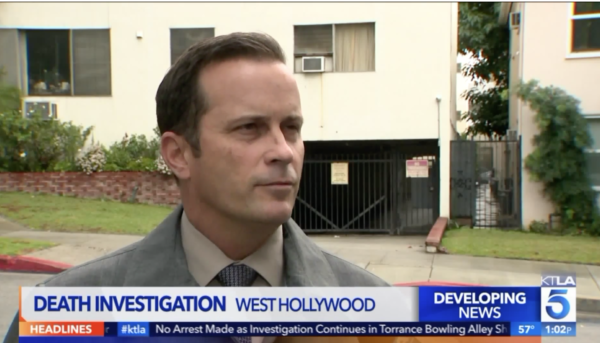
Alfred said he would not comment on any statements that were made by Buck to investigators.
Buck’s attorney, Seymour Amster, showed up outside Buck’s apartment to talk to reporters. He told KTLA that the man at Buck’s home “had already been partying … and already taken some substances” when he arrived. Amster asserted that Buck had been in the shower for some of the time between the man’s arrival and death and that Buck had not taken any substances with him.
“The individual was exhibiting bizarre behavior,” Amster said of the dead man.
“From what I know, it was an old friend who died of an accidental overdose, and unfortunately, we believe that the substance was ingested at some place other than the apartment,” Amster told the Los Angeles Times. “The person came over intoxicated.”
When Alfred returned the Los Angeles Blade’s calls in the late afternoon, he said he was not aware that the community was responding with anger and heartbreak throughout the day, thinking a second young man had died like Gemmel Moore.
But it was a day gripped by anger, stirred by silence, disrespect and lack of or misinformation.
After the Los Angeles Blade’s freelancer reached out to Det. Rodriguez in the morning, the Blade’s news editor drove to Buck’s apartment, left a message, then drove to the West Hollywood Sheriff’s station seeking answers. The Blade asked West Hollywood Watch Commander Sgt. S. Hewitt to please confirm or clarify the timeline since that station no doubt responded to the 911 call. Though explicitly informed that West Hollywood residents were concerned about two similar deaths at this apartment, Hewitt would only say that Homicide was handling the incident, catching herself mid-eye roll when the Blade persisted with questions and the answer was always the same.
In The Meantime Men’s Jeffrey King was among those angered by being stonewalled and disrespect at several levels of the Sheriff’s Department.
“I got several calls, text messages, and messages through Facebook asking what does “In the Meantime intend to do?” King told the Los Angeles Blade late Monday. “ I thought it was important to first find out the facts before I do something. I wanted to know what I was talking about.”
King says he was met with “disrespect, impatience, and lack of willingness to address the concerns I addressed that were community concerns.” When he finally spoke with two people at Homicide, he and the lead detective had a “fairly decent conversation going,” but he still couldn’t confirm or give out information.
“One more time here is a black person—forget his age—being found dead in this man’s apartment. And his death is not being addressed properly. Our community is not being respected. No one is saying anything to the family. There is no dignity to the lives of these individuals and it’s because they’re Black.”
The Homicide official who first responded to several calls from the Los Angeles Blade said there was no homicide investigation and that Homicide detectives routinely roll out for death investigations. He said LASD press relations would issue a statement and forwarded several Blade calls to Alfred, which went to voicemail. The Sheriff’s press person, while trying to be nice and polite, at first had no knowledge of the incident. She finally said a press release was being cleared by “the administration” and would be sent out when completed. But the Sheriff’s News Room site was impossible to search for press releases.
Meanwhile, the Los Angeles Blade contacted the City and members of the West Hollywood City Council for comment—hoping the Sheriff’s Department was at least telling them the facts of what happened.
The City of West Hollywood has requested “a full investigation” by the Sheriff’s Department, a press release stated.
WeHo Mayor John Duran said he would not comment and is leaving the matter in the hands of the sheriffs and District Attorney
Councilmember Lauren Meister’s response illustrates the misinformation that was circulating throughout the day. “This is tragic,” Meister told Los Angeles Blade. “My heartfelt sympathies go out to the family and friends of this young man.” However, she says she has “discussed with our City Manager and Public Safety Director this morning — the Los Angeles Sheriff’s Department and the District Attorney must provide a thorough investigation into the circumstances of this incident and any similarities to prior incidents at the same location.”
Councilmember John D’Amico said he was not going to comment, but added some information. “I asked the city manager to contact Sheriff Villanueva’s office first thing this morning and I’m going to let the DA and LASD do their jobs,” he wrote. “Mr. Buck made donations in 2011 and 2014, $1,000 total, those dollars were spent on those campaigns and the campaign accounts were closed years ago. Keith and I have made donations many times that amount every year to social service agencies that help with sobriety, HIV AIDS, mental health and homelessness. I thought that a better use of the money than returning it to Mr. Buck.”
KTLA got Alfred on camera in the afternoon, by chance, it turns out. When the Blade and other news outlets were staking out the apartment to no avail, KTLA stayed on and suddenly noted activity in the afternoon. Alfred later told the Los Angeles Blade that a call had come in saying someone was throwing something out the window that could be evidence in the second death so a patrol deputy and fire fighter dashed to the scene and recovered the object. He would not say what was found.
By late afternoon, news outlets were reporting the story—presumably because they still think Buck is a “wealthy prominent Democratic donor,” though he has been political kryptonite since Gemmel Moore’s death. The LA LGBT Center issued a statement around 4:30pm calling on the Sheriff to keep the public fully informed—which had not happened by then, and presuming that like Moore, the second death was also linked to drug abuse:
“The Los Angeles LGBT Center calls upon Los Angeles County Sheriff Alex Villanueva and his department to fully investigate this tragedy and aggressively seek justice wherever the investigation might lead. “Although the investigation is in its early stages, we urge Sheriff Villanueva to keep the public fully informed as LGBT people have a considerable and urgent interest in a case that is so clearly linked to the health and safety of our community. The reports we have heard provide more questions than answers. The fact is two black men have died at Mr. Buck’s home in less than two years. “While much is still to be learned, it appears this tragedy is linked to substance use. LGBT people and other marginalized groups are at elevated risk for impacts that result from the current epidemic uses of opioids, methamphetamine, and other dangerous drugs. The Center provides free or low-cost, comprehensive, and judgment-free addiction recovery services and has a service to provide free fentanyl testing strips to those who request them. For help or more information, contact the Center’s Addiction Recovery Services at [email protected] or 323-993-7448.”
At the end of the 11-minute interview, Alfred asked for the public’s help and indicated that he is willing to reopen the Gemmel Moore case and file criminal charges with the DA, if new evidence emerges.
“We always appreciate any help we can get from the community. They may have more knowledge about this or any similar instances that occurred—or any type of activity that occurs in the area or that particular apartment. We’re always interested in finding out what’s going on,” he said, asking anyone with information to come forward.
“Our first concern for the Homicide Bureau, specifically, is to be to fully investigate the circumstances surrounding the death of this individual. Also we’re going to look into the prior incident where Gemmel Moore had died at the scene to see if there’s any similarities,” Alfred said.
“We’re just going to look at everything we have and we’re going to see where the information and evidence takes us. And if it takes us to criminal filing or if we uncover new information—although Gemmel’s case was determined to be an accidental overdose—if we learn something new and that has to be looked at a second time, then of course, we’ll take that new information and we will investigate fully.”
From there, they’ll work with the District Attorney’s office “to determine what, if any criminal activity may have occurred and if so, present it for potential filing. But we won’t know until we’re able to do a thorough exam and all the facts come in.”
Anyone with information can call the Homicide Bureau directly at 323-890-5500 and ask for Det. Q. Rodriguez or Sgt. P. Cardella. To make an anonymous tip, go through Crime Stoppers.

Finally, if the community considers Ed Buck and the alleged use of illicit drugs in his apartment to be a public menace or nuisance, Alfred suggested that the community work with the West Hollywood Sheriff’s station to find a solution akin to the “broken windows” policy of community policing.
“As it pertains to any type of public nuisance – we’ll work with West Hollywood Sheriff’s station—who could probably get the community involved—concerning these ongoing public nuisance situations,” Alfred said. He defined public nuisance as “anything that would cause quality of life for people who live in a particular area to be lessened by these ongoing criminal acts,” major or minor. “Either way, they affect those around them. Life quality is something that can be looked at in a community policing type of thing where the station can look at the assets available and pour resources into the community to try to effect change.”
Federal Government
UPenn erases Lia Thomas’s records as part of settlement with White House
University agreed to ban trans women from women’s sports teams

In a settlement with the Trump-Vance administration announced on Tuesday, the University of Pennsylvania will ban transgender athletes from competing and erase swimming records set by transgender former student Lia Thomas.
The U.S. Department of Education’s Office for Civil Rights found the university in violation of Title IX, the federal rights law barring sex based discrimination in educational institutions, by “permitting males to compete in women’s intercollegiate athletics and to occupy women-only intimate facilities.”
The statement issued by University of Pennsylvania President J. Larry Jameson highlighted how the law’s interpretation was changed substantially under President Donald Trump’s second term.
“The Department of Education OCR investigated the participation of one transgender athlete on the women’s swimming team three years ago, during the 2021-2022 swim season,” he wrote. “At that time, Penn was in compliance with NCAA eligibility rules and Title IX as then interpreted.”
Jameson continued, “Penn has always followed — and continues to follow — Title IX and the applicable policy of the NCAA regarding transgender athletes. NCAA eligibility rules changed in February 2025 with Executive Orders 14168 and 14201 and Penn will continue to adhere to these new rules.”
Writing that “we acknowledge that some student-athletes were disadvantaged by these rules” in place while Thomas was allowed to compete, the university president added, “We recognize this and will apologize to those who experienced a competitive disadvantage or experienced anxiety because of the policies in effect at the time.”
“Today’s resolution agreement with UPenn is yet another example of the Trump effect in action,” Education Secretary Linda McMahon said in a statement. “Thanks to the leadership of President Trump, UPenn has agreed both to apologize for its past Title IX violations and to ensure that women’s sports are protected at the university for future generations of female athletes.”
Under former President Joe Biden, the department’s Office of Civil Rights sought to protect against anti-LGBTQ discrimination in education, bringing investigations and enforcement actions in cases where school officials might, for example, require trans students to use restrooms and facilities consistent with their birth sex or fail to respond to peer harassment over their gender identity.
Much of the legal reasoning behind the Biden-Harris administration’s positions extended from the 2020 U.S. Supreme Court case Bostock v. Clayton County, which found that sex-based discrimination includes that which is based on sexual orientation or gender identity under Title VII rules covering employment practices.
The Trump-Vance administration last week put the state of California on notice that its trans athlete policies were, or once were, in violation of Title IX, which comes amid the ongoing battle with Maine over the same issue.
New York
Two teens shot steps from Stonewall Inn after NYC Pride parade
One of the victims remains in critical condition

On Sunday night, following the annual NYC Pride March, two girls were shot in Sheridan Square, feet away from the historic Stonewall Inn.
According to an NYPD report, the two girls, aged 16 and 17, were shot around 10:15 p.m. as Pride festivities began to wind down. The 16-year-old was struck in the head and, according to police sources, is said to be in critical condition, while the 17-year-old was said to be in stable condition.
The Washington Blade confirmed with the NYPD the details from the police reports and learned no arrests had been made as of noon Monday.
The shooting took place in the Greenwich Village neighborhood of Manhattan, mere feet away from the most famous gay bar in the city — if not the world — the Stonewall Inn. Earlier that day, hundreds of thousands of people marched down Christopher Street to celebrate 55 years of LGBTQ people standing up for their rights.
In June 1969, after police raided the Stonewall Inn, members of the LGBTQ community pushed back, sparking what became known as the Stonewall riots. Over the course of two days, LGBTQ New Yorkers protested the discriminatory policing of queer spaces across the city and mobilized to speak out — and throw bottles if need be — at officers attempting to suppress their existence.
The following year, LGBTQ people returned to the Stonewall Inn and marched through the same streets where queer New Yorkers had been arrested, marking the first “Gay Pride March” in history and declaring that LGBTQ people were not going anywhere.
New York State Assemblywoman Deborah Glick, whose district includes Greenwich Village, took to social media to comment on the shooting.
“After decades of peaceful Pride celebrations — this year gun fire and two people shot near the Stonewall Inn is a reminder that gun violence is everywhere,” the lesbian lawmaker said on X. “Guns are a problem despite the NRA BS.”
New York
Zohran Mamdani participates in NYC Pride parade
Mayoral candidate has detailed LGBTQ rights platform

Zohran Mamdani, the candidate for mayor of New York City who pulled a surprise victory in the primary contest last week, walked in the city’s Pride parade on Sunday.
The Democratic Socialist and New York State Assembly member published photos on social media with New York Attorney General Letitia James, telling followers it was “a joy to march in NYC Pride with the people’s champ” and to “see so many friends on this gorgeous day.”
“Happy Pride NYC,” he wrote, adding a rainbow emoji.
Mamdani’s platform includes a detailed plan for LGBTQ people who “across the United States are facing an increasingly hostile political environment.”
His campaign website explains: “New York City must be a refuge for LGBTQIA+ people, but private institutions in our own city have already started capitulating to Trump’s assault on trans rights.
“Meanwhile, the cost of living crisis confronting working class people across the city hits the LGBTQIA+ community particularly hard, with higher rates of unemployment and homelessness than the rest of the city.”
“The Mamdani administration will protect LGBTQIA+ New Yorkers by expanding and protecting gender-affirming care citywide, making NYC an LGBTQIA+ sanctuary city, and creating the Office of LGBTQIA+ Affairs.”



